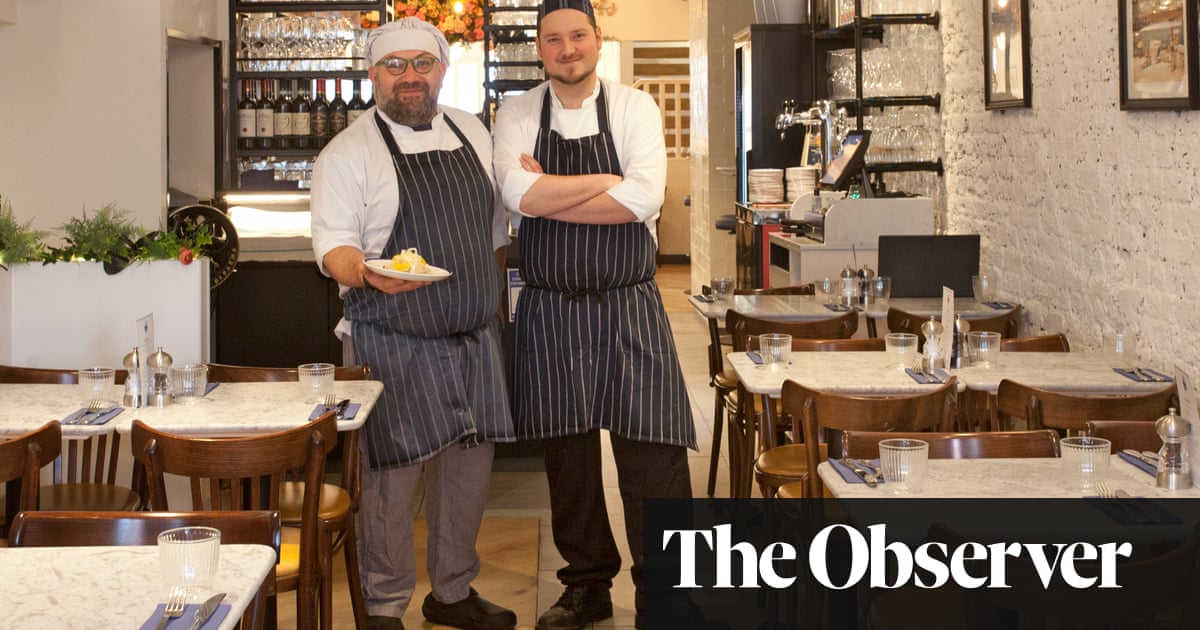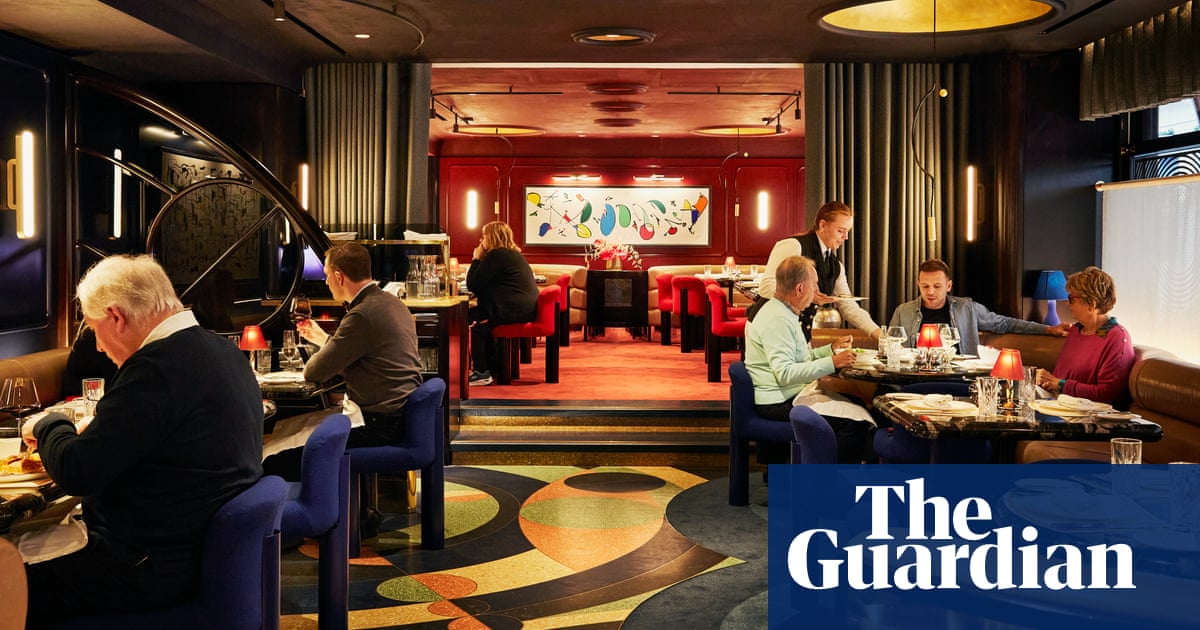
A Braccetto, 242 Earls Court Road, London SW5 9AA (a-braccetto.com). Antipasti £7.95, mains £14.95-£26.50, desserts £7.35, wines from £35 a bottle
There are sights in London that are so familiar they now go largely unremarked, despite how deserving of comment they are: the sleek, well-fed mice which skitter between the tracks in tube stations; the over-lit shops stocked with bags of American confectionary, which seem never to attract a customer (but have now attracted the attentions of the Revenue); the branch of sturdy hardware mongers Robert Dyas, which trades amid the fancy hotels and glossy theatres along St Martin’s Lane, there for all your emergency duct tape needs.
To these should be added the nine-strong Spaghetti House group. The first was opened on Goodge Street in 1955 by Simone Lavarini. Its slogan then: “Spaghetti, but not on toast”, which says much about the state of British food in those years. It was a key player in the period’s trattoria boom, trading in the impossibly exotic joys and brilliant sunshine of a kind of Italian food that few had encountered before. Along the way, Spaghetti House grew across the capital. In 1975, it embedded itself in the psyches of those of us of a certain age, courtesy of a thrilling six-day siege that took place at the Knightsbridge branch.
Almost 70 years after the first Spaghetti House opened, it is still owned by the same family. Its menu has changed a little over the years. It has become fluent in balsamic vinegar, arancini and cacio e pepe, as the whirligig of food fashion has demanded. But they still serve minestrone soup, spaghetti alla bolognese and a margherita pizza. It may get little attention, but it endures, because it does its thing well at a good price. Spaghetti House has become a gloriously fixed point in a restaurant business famous for restless churn.
Hence, when the same family launches a new venture, we should probably pay attention. A Braccetto, which roughly means arm-in-arm, occupies a narrow site close by Earl’s Court tube station, which has previously been a Byron Burger and a fried-chicken shop. Now it is a brightly lit trattoria: white walls, a bit of distressed brickwork, flashes of blue banquette, a little hanging foliage, some of which may never need watering. There is an open kitchen, servicing a menu that has turned its face against the Spaghetti House imperative of being all things to all people. It has a curious amount of breadth, but little depth. There are just four antipasti, four pizzas, five pasta dishes and three secondi.
In places it feels like a conscious act of discernment. Among the antipasti, for example, is a truly delightful dish of smoked, thinly sliced tuna, with bite and tension, dressed with seriously good olive oil, then piled with a salad of ribbon-thin fennel and orange. It tastes of summer. Perhaps unsurprisingly, given the company’s heritage, the pasta dish we try is the ideal and expert coming together of fast and slow. Ribbons of yellow pappardelle are piled with a thyme-flecked ragu. The ragu has clearly been cooked down for hours; the pasta taken from the boiling waters before it loses its bite.
Then there’s the pizza. In the interests of full disclosure, I should tell you that I have been in the pay of Big Pizza for well over a year now. Once a month I trade my keyboard talents for an American Hot on a romana base with extra salted anchovies, at a branch of Pizza Express. It’s what happens when your band has a residency playing the great jazz rooms at Pizza Express Dean Street and Holborn. You get free pizza before the show, and I bloody love it. You are, of course, welcome to regard my addiction to the thin-crusted, salty, chilli-boosted American Hot with a certain amount of suspicion. I’ll take it on the chin and just keep ordering them. That said, the romana pizzas here are different creatures entirely from the roaring hands-in-the-air crowd-pleasers served by my music patrons. The crust is thinner and crisper, and there’s an uncommon subtlety to the toppings. Alongside the soft folds of spicy salsiccia calabrese, the fronds of rocket and olives on the piccante, there’s a post-oven grating of lemon zest that gives a delicate and lofty top note to the whole affair. At £16.95 it is also 70p cheaper than the Pizza Express offering.
Not everything is great. The extremely lean sirloin steak in a tagliata has been “reverse seared”: cooked through to a weird uniform, cotton-wool pink, before being seared briefly. It then sits, completely under-seasoned and looking sorry for itself, on one side of the plate, next to a wan pile of rocket. The whole point of the dish is that the steak is laid over the foliage so that the juices dress the salad. It’s a weird and disappointing misstep, especially for £26.50.
But it’s not quite as weird or as disappointing as the bizarre drinks offering that, given the generally reasonable prices for the food, feels like a violent and aggressive act. It reads as though it was written by someone desperately trying to stage an intervention to stop you drinking. There are just four white wines and four reds, all of them interesting-looking Italians: there’s a verdicchio, a gavi, a primitivo and so on. Perhaps I should only look at them, because the cheapest white is £35. Then it goes £48, £57 and £67. And that’s it. The reds go £35, £48, £65 and £69. It’s a wine list written for an entirely different business; one I’m not keen on visiting. I’m often criticised for focusing too much on the cost of wine in these reviews, but it’s never by restaurant goers. It’s always by people who earn a living from the stuff: by wine merchants, sommeliers and writers. I make no apology for doing so here, because it really is odd.
I finish with a bowl of hazelnut and chocolate fried “hugs” which is a fancy name for tiny, sugar-crusted doughnuts filled with Nutella and served hot from the fryer. It’s the kind of thing someone feeds you when they desperately want you to love them. It almost does the job. No, A Braccetto is not perfect. But over seven decades this team has proved itself skilled at adapting to changes in taste and fashion. Betting against them sorting this place out would be foolish. For all its current faults – did I mention the wine list? – I think a lot of people would be delighted if one of these opened on their high street. I know I would.
News bites
The Aldwark Manor Estate hotel, a few miles outside York, is launching a Winston Churchill-themed restaurant called Chartwell next month. The 24-cover space will be headed up by Chris O’Callaghan, who has cooked at the Fat Duck and Midsummer House, and will offer two tasting menus named after Churchill’s favourite brand of champagne, Pol Roger. The Pol tasting menu will cost £95, and the Roger, £130. Opening dishes will include roast beef with caviar, smoked eel and celeriac, and barbecued scallop with cauliflower and grape (aldwarkmanorestate.co.uk).
Eddie Scott, who won MasterChef in 2022, is to open his first restaurant next month. L’Opaline Bistrot is in Beverley, East Yorkshire, and will offer a menu mixing French and Indian classics, which means you could have both a biryani and a choucroute. Writing on Instagram, Scott said the food would be “a celebration of my passion for the classic cuisines of France and India, featuring no-nonsense, rustic and regional dishes” (opalinebistrot.com).
And finally, if you like reading about restaurants, which you probably do, can I recommend a recent piece by Lauren Collins in the New Yorker about Les Grands Buffets, an extraordinary all-you-can-eat joint located in a recreation centre in Narbonne, which may well be the most popular booking in the whole of France. For just over 50 euros, diners have access to an unlimited array of French classics, including a cheese room with a world record-breaking 111 options. You can read it here. Coincidentally, Marina O’Loughlin also writes beautifully about Les Grand Buffets in the latest edition of the hugely entertaining Noble Rot food and drink magazine, from the team behind the restaurants of the same name (noblerot.co.uk).












